by Chris Hilburn-Trenkle
(All photos courtesy Jafar Fallahi/Jafar Fallahi Photography)
More than 500 licensed social workers, parents, advocates and community leaders joined together virtually and in person at the Friday Conference Center on Friday, March 8, with the shared goal of finding ways to empower individuals with intellectual or developmental disabilities as part of the third annual Legacy Speakers Series.
Sponsored by the University of North Carolina at Chapel Hill School of Social Work, this year’s event focused on “Thriving with I/DD Across the Lifespan.”
UNC Center for Aging and Adult Research and Education Services (Cares) Director Linda Kendall-Fields and Family Support Program Manager Laurel Powell were instrumental in organizing the 2024 speakers series, with the goal of celebrating resiliency and agency for individuals with intellectual or developmental disabilities by showing their struggles and triumphs and giving them outlets for care around the state. Attendees received information from multiple exhibitors that provided support services and resources, including Work Together NC, UNC TEACCH; Hope North Carolina, Inc.; and AKALAKA.
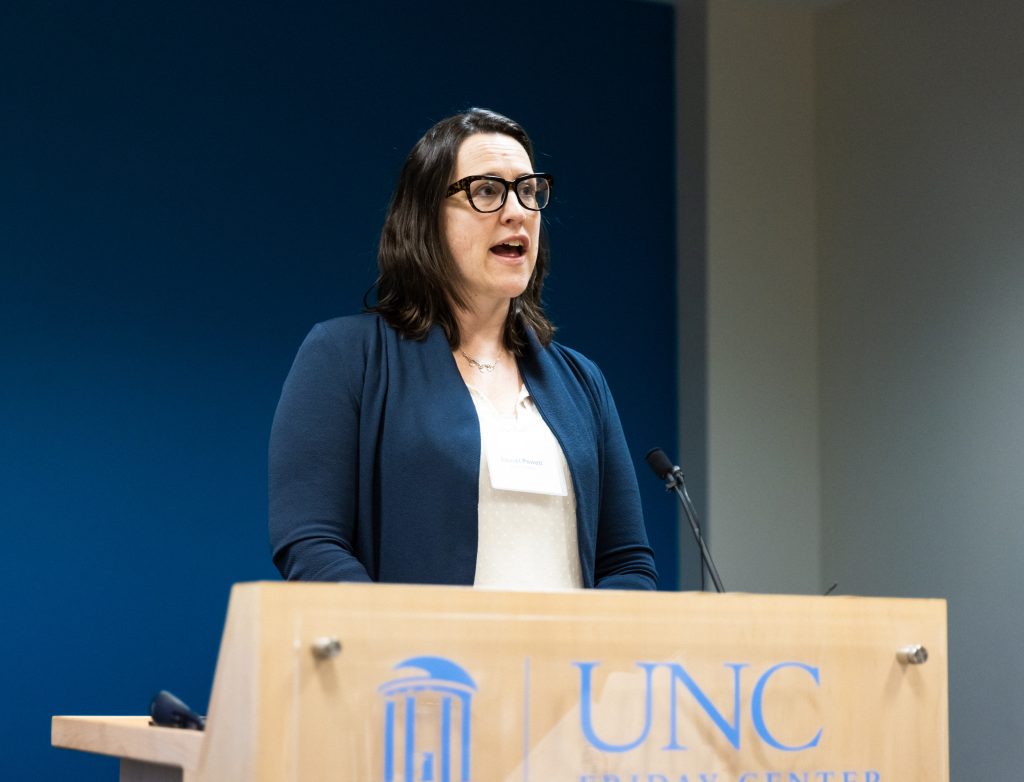
Developed by Dean Ramona Denby-Brinson in 2022, the series offers the School of Social Work and the larger community a chance to acknowledge the strides made in addressing social problems and finding solutions for remaining obstacles.
“At the core of what we do as social workers, our value base, is to partner and be in community with people who we know are living the challenges, thriving, coming up with their own solutions,” Denby-Brinson said as she welcomed attendees to the event. “That’s what we intend to do. We hope that we will continue this conversation. This is not a one-and-done for us. We have stood-up infrastructure at our School to continue to advance system change in this space and we just hope that we can continue with you all to plan and bring about important changes for our community.”
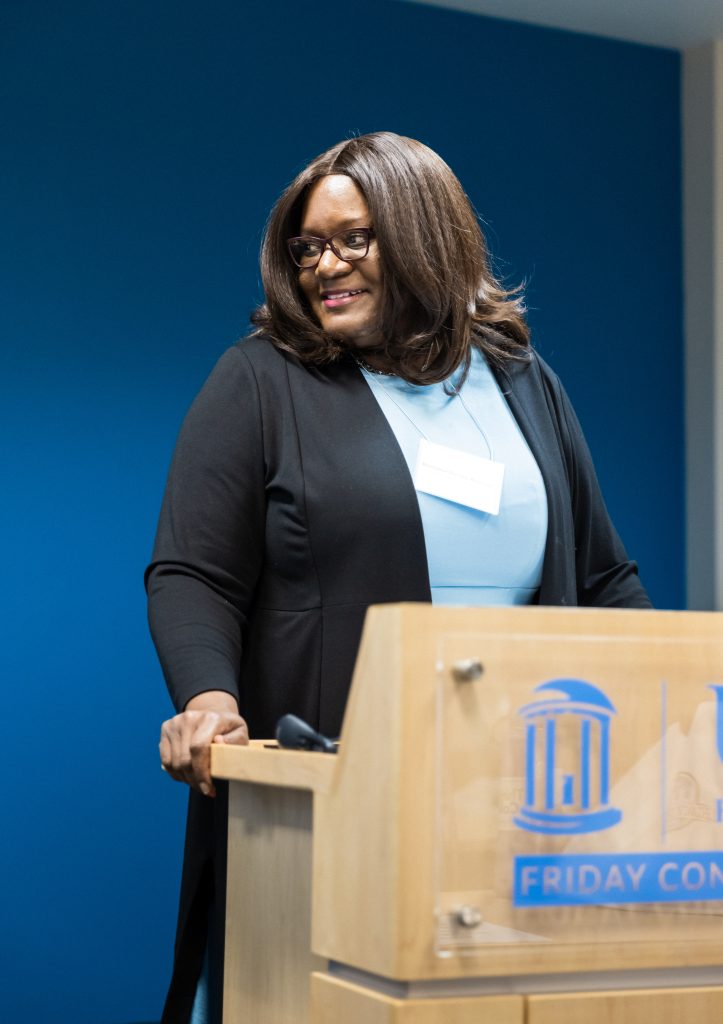
The event was highlighted by three panel discussions focused on building self-determination in childhood, transitioning to adulthood while cultivating independence and a sense of community, and helping individuals with I/DD and their caregivers through the aging process. An American Sign Language interpreter and captioner were available for both in-person and virtual attendees. Kendall-Fields also conducted a short presentation on a new North Carolina law that went into effect Jan. 1, 2024, which gives individuals affected by the guardianship system more agency over their lives.
This year’s speakers series featured keynote speaker Sheli Reynolds, Ph.D., the key developer of the Charting the LifeCourse framework and tools and senior associate director at UMKC Institute for Human Development.
Reynolds shared that her work is driven by her own experience having a younger brother with a developmental disability. While pursuing her master’s degree in occupational therapy, Reynolds learned about university centers for excellence in developmental disabilities, leading her to intern at the UMKC Institute for Human Development.
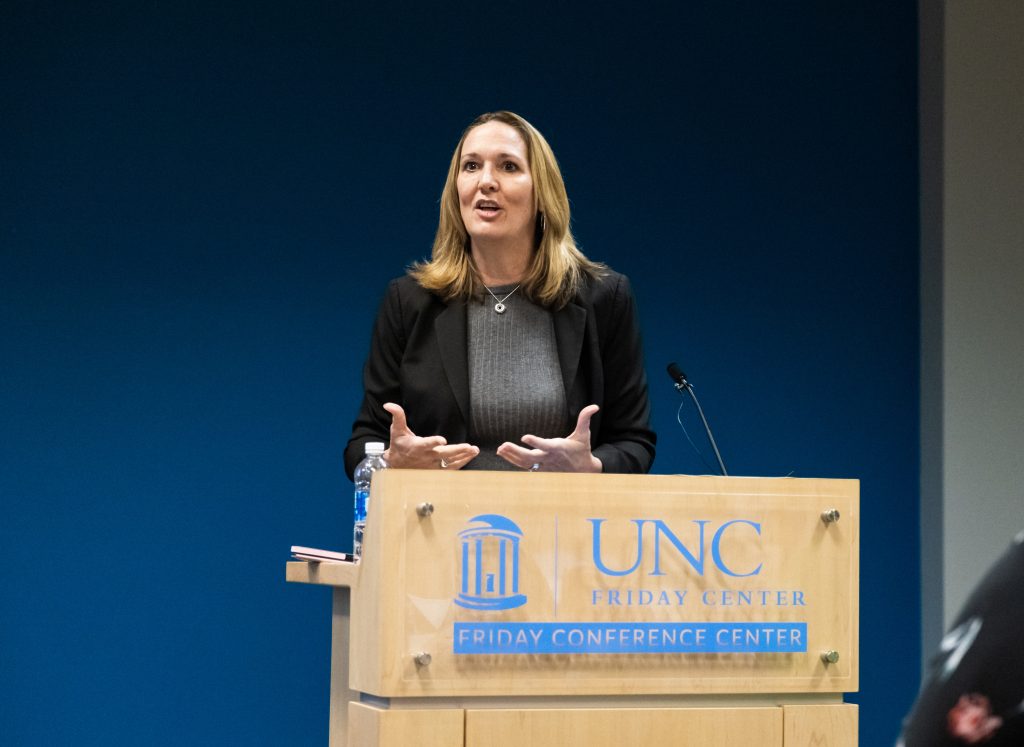
Nearly 30 years later, Reynolds has become a leading advocate for supporting families and self-advocates at a national level, creating the Charting the LifeCourse framework and serving on the President’s Committee for People with Intellectual Disabilities for former President Barack Obama.
Charting the LifeCourse is a framework created for individuals and families. It uses plain language and descriptive imagery to describe guiding principles that help people plan, solve problems and explore at each stage of life, such as planning for retirement, managing health care or thriving with an intellectual or developmental disability.
“When we’re thinking about supporting people, we need to think about supporting them very differently, and it’s not just, ‘What service can I get them? Where can they go get the service?
What provider is available to me?’” Reynolds said. “But it’s also thinking about how are we really integrating and leveraging their strengths and their resources? How are we thinking about the relationships in their lives? We already know the statistics that many people live at home with their families. How are we both leveraging that, but how are we also supporting that family to have their own identity and their own personhood as each one of those family members?”
Reynolds described the different life domains and stages, ranging from “prenatal/infancy” to “advocacy and engagement” and “aging,” shared the framework’s vision and broke down the reciprocal roles that allowed individuals and their families to care for and about each other. She also shared the different “support buckets” for individuals and families and explained the “integrated supports and services for a ‘good life,’” including technology, relationships and community.
“The bottom line is transformation is driven by you guys,” Reynolds said. “It’s driven by you guys having these conversations, having these values and coming together. We cannot make decisions without it being driven by the people that our services are impacting the most and that’s what has to change. We need more people with disabilities who are researchers and practitioners and directors and legislators … how are we really elevating the voices of those with lived experiences so they’re leading the charge of our work?”
Panel Discussions
Nurturing Self-Determination in Childhood: Starting Strong in School and at Home
Moderator: Laurie Selz-Campbell, Clinical Associate Professor, UNC School of Social Work
Panelists:
- Kara Hume, Associate Professor, UNC School of Education Faculty Fellow, FPG Child Development Institute
- Cheryl Walfall-Flagg, Parent Advocate
- Tamira White, UNC Cares Community Engagement Specialist
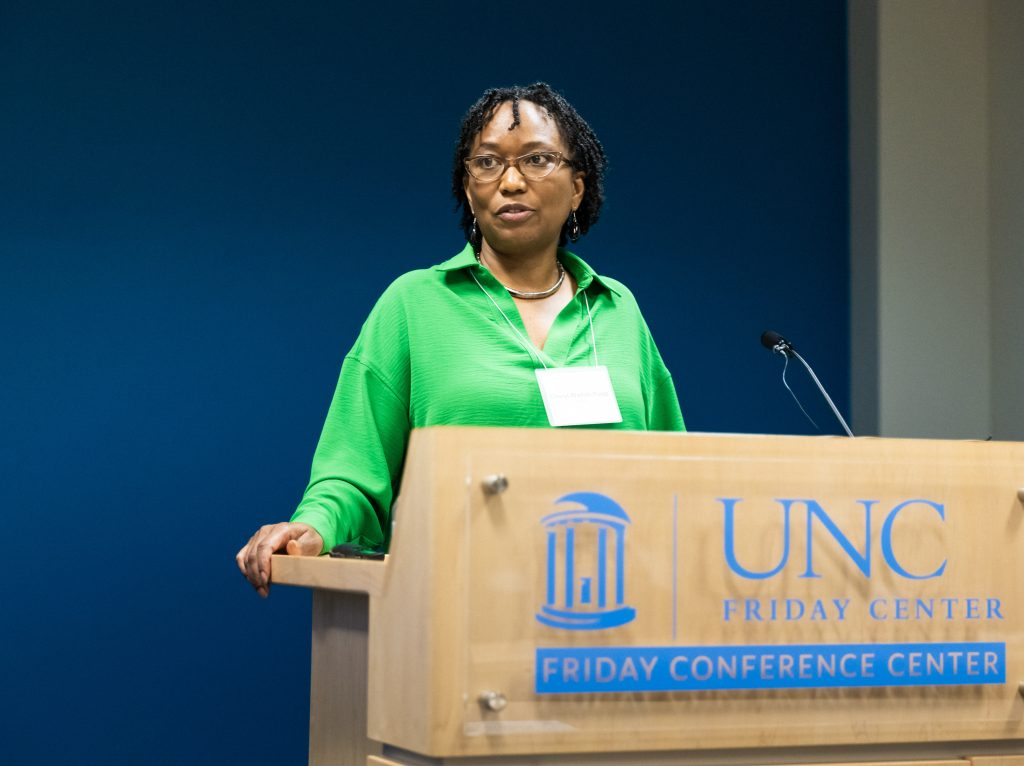
Key Takeaways:
- Self-determination is a predictor of positive outcomes, through both greater academic and transition outcomes and increased postsecondary outcomes. It’s an essential human right.
- It’s never too early to build self-determination in young children. It’s developmentally appropriate in early childhood and for school-aged children, helping to increase self-determination later in life.
- Facilitating self-determination can be as simple as figuring out what individuals are excited about, what they want to learn and what their values are. Once you have that understanding, you can help to influence and boost that person’s life.
- Collaboration across the community is essential.
- Having opportunities and resources available is important in cultivating skills at an early age to help children as they grow up and focus on building self-determination and pursuing a secondary education or any other goals they might have.
- Individuals with disabilities are very often less likely to be provided with opportunities to make choices and decisions about their lives. They have fewer opportunities to express their own interests and abilities.
Exercising Choice in Adulthood: Cultivating Relationships and Creating Community
Moderator: Linda Kendall-Fields, UNC Cares Program Director
Panelists:
- Morgan Parlier, MSW, LCSW, Clinical Social Work Faculty, Carolina Institute for Developmental Disabilities
- Jacklyn Gerda Boheler, MS, OTR/L TEACCH Autism Program, Project Coordinator | Work Together NC & HEELS 2 Participation
- Betsy MacMichael, Parent Advocate, Executive Director, First in Families of North Carolina
- Janie Desmond, Self-Advocate
- Ms. T. Wrein, Self-Advocate
- Violet Child-Lanning, Direct Support Professional
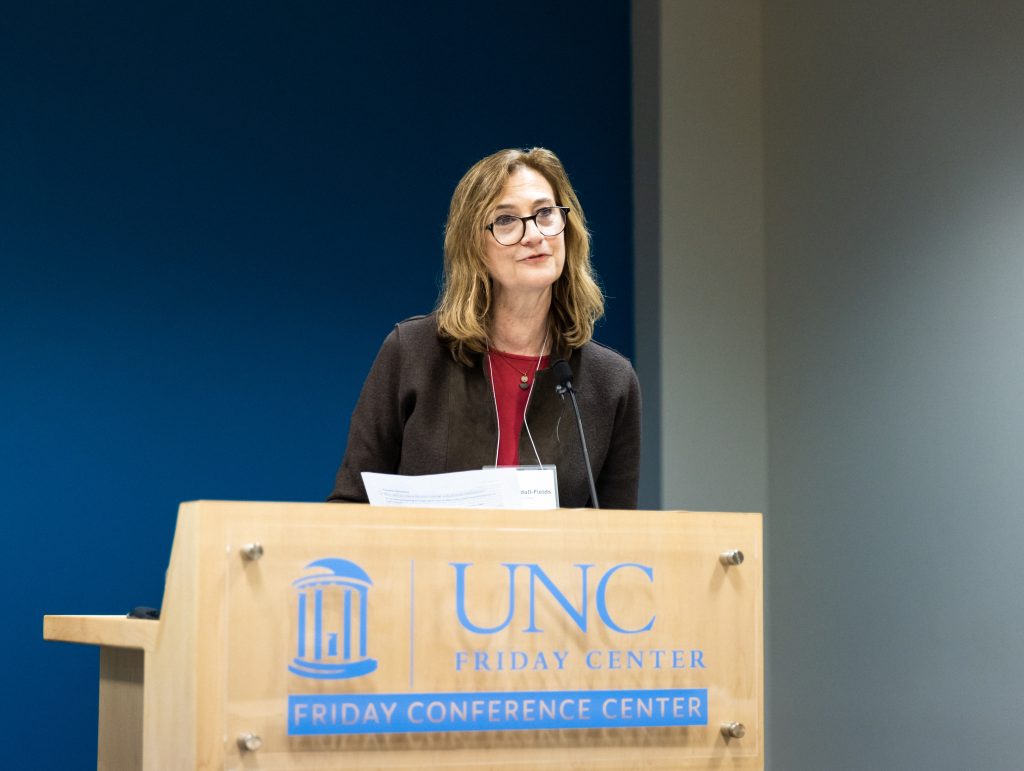
Key Takeaways:
- It’s important to help build sexual health equity for individuals with I/DD through training, education, community partnerships, and policy advocacy. Individuals, caregivers and a strong community are all important factors in this process.
- Betsy MacMichael shared stories about Janie (her daughter) and Ms. T, two self-advocates, including how they are living their lives on their own terms in a neighborhood in downtown Durham. The area is full of people and businesses and offers social opportunities and job opportunities.
- People with I/DD are seven times more likely to be sexually assaulted than the general population. It’s important to have training for supporting survivors and helping to build a knowledge base.
- Panelists shared recommended policies to support sexual health equity. The goal is to increase awareness, promote self-determination and improve outcomes.
- Panelists shared the work of the organization Work Together NC, a community collaboration that helps the transition to adulthood for people with intellectual and developmental disabilities.
- Ms. T shared how much she loves living independently and felt it was important for her to be included in activities instead of others doing tasks for her.
Balancing Perspectives: A Look at Supporting the Aging Journey for People with I/DD and their Caregivers
Moderator: Kenneth Kelty, Disability Advocate and Speaker, UNC Carolina Institute for Developmental Disabilities
Panelists:
- William Donohue and Deborah Woolard, Parent Advocates
- Laura Wells, Director, HOPE/IDEAL Communities
- Sheli Reynolds, UMKC Center for Human Development
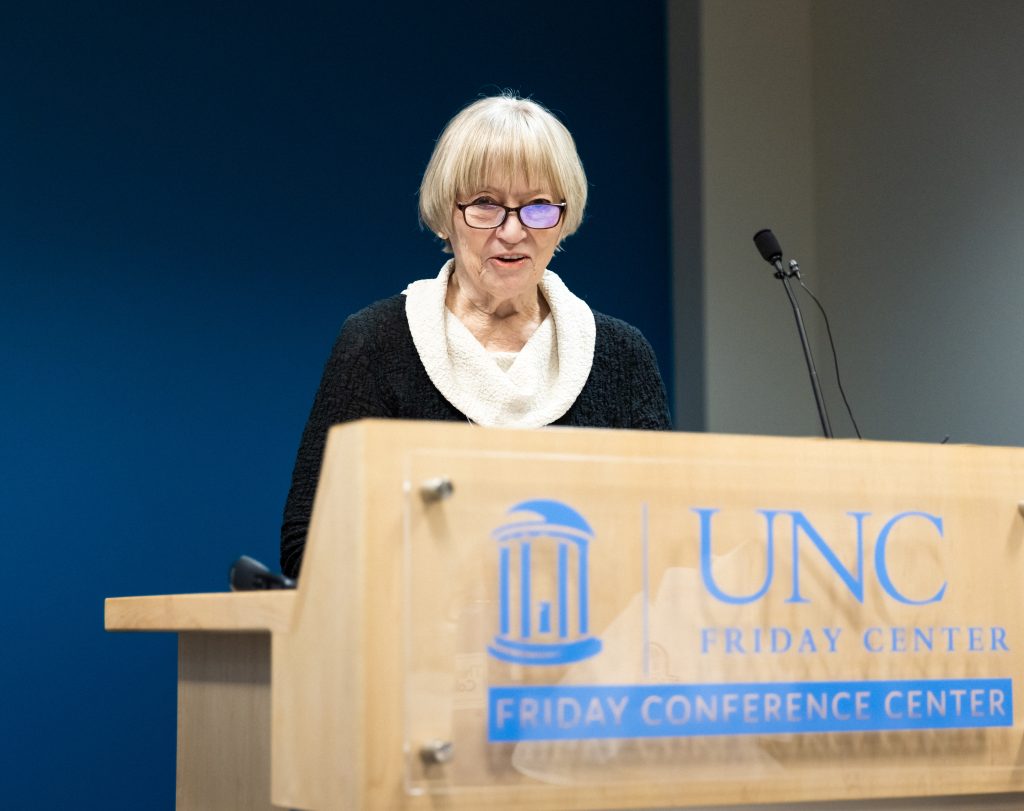
Key Takeaways:
- It’s important to continue the process of personal growth and lifelong learning for those with I/DD. The journey isn’t always on the same timeline for all people.
- People in your daily life become crucial during your aging process. Your community around you helps to keep you safe and support you when needed.
- Aging changes happen earlier for people with I/DD, so it’s important to recognize that and tap into aging services that will benefit the person with I/DD and their caregivers.
- It’s important to ensure there is safety and security around your home and community and to have protections in place.
- Hope North Carolina, Inc. is helping to build a community to nurture independence and interdependence with a supportive, safe environment and a healthy community. There is currently a shortage in the state of communities like that. These housing communities create inclusive housing options for adults with I/DD.
- Decision-making directly leads to identity and helps contribute to a good life.
- Everyone should have the chance to live in a community where all people are valued.
Related Stories
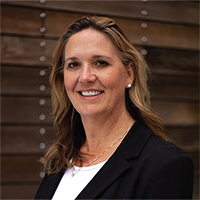
Dr. Sheli Reynolds On “Charting the LifeCourse” framework
We spoke with Legacy Speakers Series keynote speaker Dr. Sheli Reynolds ahead of the event to discuss her framework “Charting the LifeCourse.”
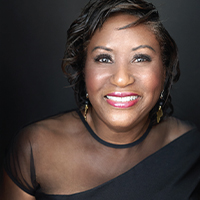
Renowned speaker to present annual Bobby Boyd Leadership Lecture
The School of Social Work welcomes Carolyn West as the guest speaker for the 2024 annual Bobby Boyd Leadership Lecture Series.

